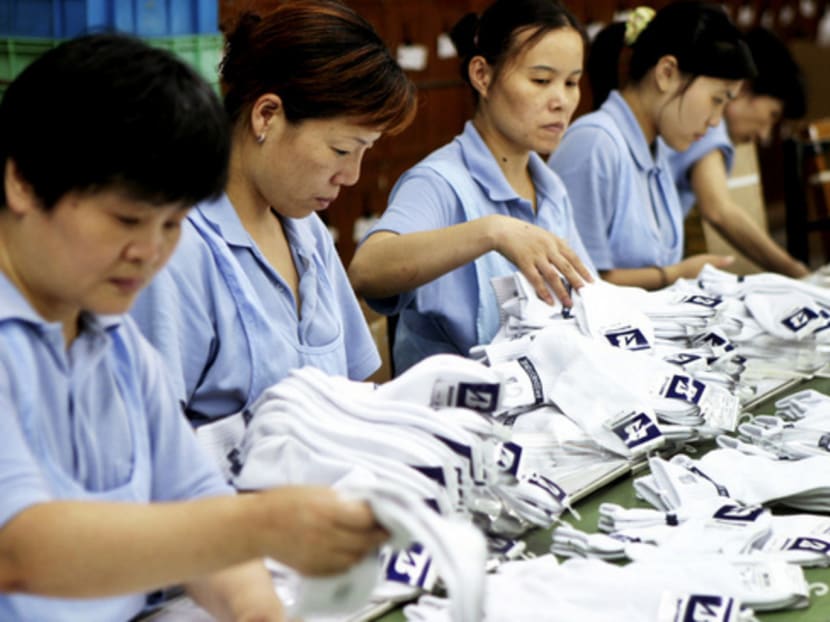Sock City woes highlight problems with China’s minimum wage policy
BEIJING — Wages at Ms Chen Fengying’s sock factory on China’s east coast have soared almost sixfold in seven years. The 20 per cent increase she expects next year may doom her seven-year-old company as profit and revenue fall.

Higher wages and other costs have led manufacturers of items from shoes to furniture to begin shifting some production to countries such as Bangladesh and Vietnam. PHOTO: REUTERS
BEIJING — Wages at Ms Chen Fengying’s sock factory on China’s east coast have soared almost sixfold in seven years. The 20 per cent increase she expects next year may doom her seven-year-old company as profit and revenue fall.
“If things go on like this, we’ll just close down,” said Ms Chen from Zhuji in Zhejiang province, the so-called Sock City that produces 17 billion pairs annually — more than 35 per cent of global production. “Many factories have already died.”
The plight of Ms Chen’s Zhejiang Zhuji Luyi Knitwear highlights the clash between government policies to encourage rapid wage growth and those to spur private enterprise.
While both were possible as China’s low-cost manufacturing engine surged, a loss of competitiveness and the slowest economic expansion in a generation is squeezing profitability for credit-constrained small- and medium-sized companies.
Salary increases will slow as a result, hindering the rebalance away from investment-led growth, said Mr Andrew Polk, Beijing-based economist with the Conference Board.
“Wage growth will absolutely have to come down,” said Mr Polk, who estimates China’s expansion will moderate to about 4 per cent annually after 2020.
“As the economy slows, wage growth slows. It’s one reason why consumption won’t suddenly become a major driver of Chinese growth.”
China uses minimum wages to influence private-sector pay checks as part of its strategy to boost consumption and reduce inequality.
Its 12th five-year plan to next year mandated that minimum wages should increase by an annual average exceeding 13 per cent.
Wages are typically higher in wealthy coastal provinces including Zhejiang.
Policies to bolster small and medium enterprises were espoused in a 2009 statement by the state council and subsequent proclamations that said fostering small businesses would increase employment, boost growth and enhance innovation.
That was reinforced last year when leaders vowed to transition from a system of state-directed credit to one where markets play a decisive role in pricing capital.
Profit growth of private enterprises dropped to 9.7 per cent in the first nine months from a year earlier compared with 14.8 per cent last year.
Average private-sector manufacturing wages rose 13.5 per cent last year after a 16.9 per cent gain in 2012.
Workers have become accustomed to double-digit pay gains.
Truck driver Wang Lianqi, 44, has seen his wages increase from 2,800 yuan (S$595) a month a decade ago to about 7,000 yuan, he said.
“The salary will not stop rising,” he said on the outskirts of Beijing.
Saving for an apartment in Tianjin and with two children to raise, he is banking on continued pay gains of at least 10 per cent annually, he said between deliveries.
Challenging the virtue of rapid wage growth can be taboo, as highlighted last month when Mr Cai Fang, vice-president of the Chinese Academy of Social Sciences, was rebuked by state media for saying “excessively rapid growth” of salaries would hurt the economy.
The official Shanghai Daily’s opinion writer Ni Tao wrote that wage increases are required to shift away from a manufacturing-led economy and that “it’s absurd” to say incomes are growing too quickly.
The state media’s response underscores the political sensitivity around wage increases after three decades of 10 per cent annual average economic growth failed to prevent rising wealth inequality.
“The irony for many years was that the Chinese people weren’t fully benefiting from incredible growth of the People’s Republic of China,” said Mr David Loevinger, former United States Treasury Department senior coordinator for China affairs.
“Recently, wages have been catching up,” added Mr Loevinger.
Higher wages and other costs have led manufacturers of items from shoes to furniture to begin shifting some production to countries such as Bangladesh and Vietnam, which surpassed China in 2010 as the largest supplier of Nike footwear.
Sock maker Chen, 47, employs 20 workers now, down from a peak of about 100.
She was forced to give staff three weeks’ unpaid leave this year because she had no new orders, she said.
Revenue this year will be about half the 10 million yuan achieved in both 2011 and 2012 and profit has fallen even more, she said.
She pays staff on average more than 5,000 yuan a month, up from 3,700 yuan last year and 870 yuan in 2007.
“If wages keep increasing like this, we won’t have any profit,” Ms Chen said. BLOOMBERG





